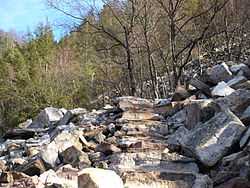Standing Stone Trail
| Standing Stone Trail | |
|---|---|
 A picture of the "Thousand Steps" | |
| Length | 72 mi (116 km) |
| Location | Fulton / Mifflin / Huntingdon counties, Pennsylvania, USA |
| Trailheads |
North: Greenwood Furnace State Park near McAlevys Fort, Pennsylvania South: Tuscarora Trail in Buchanan State Forest |
| Use | Hiking |
| Hiking details | |
| Trail difficulty | Moderate to Strenuous |
| Season | Spring to Fall |
| Sights | Pastoral views and cultural remnants |
| Hazards |
Severe Weather Poison ivy American Black Bear Timber Rattler |
The Standing Stone Trail (SST) is a 72-mile (116 km) long main trail network with side trails located in the Ridge-and-valley Appalachians of Central Pennsylvania. The SST was known as the Link Trail, commemorating its connection from the Mid State Trail to the Tuscarora Trail, until its name was changed in January 2007. In 2006, the SST (then the Link Trail) was announced as part of the Great Eastern Trail network of footpaths intended to extend from Alabama to New York.
The northern terminus of the trail is at Greenwood Furnace State Park near McAlevys Fort, Pennsylvania. The southern end is a junction with Tuscarora Trail in Buchanan State Forest near Cowans Gap State Park. The SST uses both public (state park, state forest, state game land) and private lands.
The Standing Stone Trail has many views offered by its placement on narrow ridges, and interesting cultural remnants such as Thousand Steps near Mapleton, Pennsylvania.
Marking
The main trail is marked with rectangular orange blazes. Blue blazes are used to mark other trails. The club marks the trail with single rectangles and two rectangles to denote turns.
Hazards
While black bears, bobcats and rattlesnakes can present dangers, it is only if you are foolish or very unlucky. When bears and people cross paths in the wild, usually the bear just wishes to leave the area. Very rarely will a bear act hostile towards people; the American Black Bear article contains good information on how to handle those atypical situations.
The common rattlesnake of Pennsylvania, the Timber Rattler (Crotalus horridus horridus), has venom of a medium potency that can cause painful injuries but is rarely lethal. Administering proper first aid, keeping calm and quickly receiving medical attention is the best response to a bite.
See also
- Rothrock State Forest
- Buchanan State Forest
- Pennsylvania State Gamelands
- Great Eastern Trail
External links
- Standing Stone Trail Club - official website
References
| |||||||